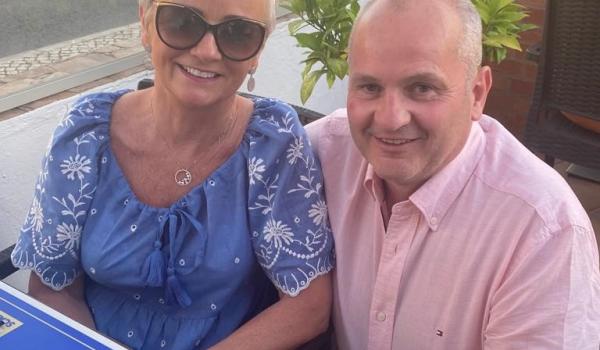With a quarter of women feeling like they aren't given the chance to discuss their diagnosis, and 48% not signposted to charities for support, it is vital that we continue to offer support to everyone affected by ovarian cancer.
Hear first-hand from husband and wife, Declan and Pauline, about how our supportive services helped them individually and together.
We met when we were 16, married when we were 23, and now here we are 36 years later with three adult children, and just retired. A couple of years ago we didn’t think we’d be where we are right now, but we’re starting to live again.
Seeing Pauline and Declan Donnelly from Northern Ireland smile and laugh, it's hard to imagine the depths of anxiety and turmoil they have experienced in the last two years, individually and as a couple.
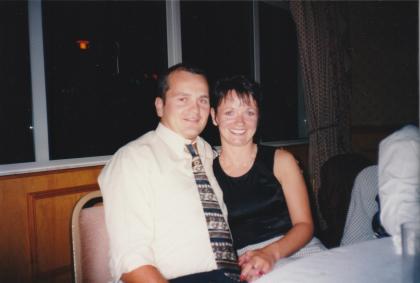
In 2021, at 57 years old, Pauline – a seasoned runner – started to feel unusually fatigued. With the impact of the pandemic, working alongside Declan in their family business and looking after elderly parents, she reasoned that perhaps it had all taken its toll.
However, the tiredness, coupled with an “unusual feeling” in her lower abdomen whilst out walking and changes in her bladder and bowel habits, led her to consult her GP. Pauline praises her GP for being aware of the symptoms of ovarian cancer, and for asking the right questions.
It was due to this that nine days later, after a CA125 blood test and scan, Pauline was referred to the hospital and soon told she had stage 4b ovarian cancer.
Not only did I have ovarian cancer, but it had spread outside of the abdomen into the lymph nodes of my chest, around the oesophagus and heart; and it was also on my bowel. It was a devastating time; I just couldn’t believe that only one month before I was living the life I was, being as busy as I was, and feeling so fit. It was a huge shock.
Sat outside the room was Declan. Pauline’s childhood sweetheart, husband, father to her three children, business and life partner. He was called into the room.
In those first few minutes a hundred thoughts went through my head, but not one of them was about business or the things that only a short time earlier seemed so important. My instinctive question was how do we fix this?
"I was told we don’t, it’s incurable, but there’s a chance it could be treated as an on-going chronic illness, and we could live with it. So that’s what I focused on, but in the following six months, such was my sadness, there wasn’t a day that I didn’t break down on at least three occasions.
"I was fortunate that I could ‘step back’ from my business and, when I wasn’t looking after Pauline, I would be in my study night after night, day after day, researching into ovarian cancer, trying to find solutions and pathways, and glimmers of hope for Pauline.
"As my background is in biological science, this was risky - it was just enough to allow me to comprehend the data and scientific papers I was reading, without the necessary understanding of those working in the field; to tease me in my hope of finding a pathway for Pauline, where we needed every fork in the journey to open in her favour.”
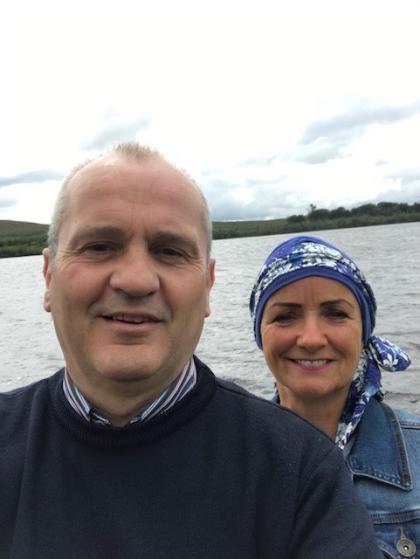
Following Pauline’s diagnosis, she became extremely ill and other symptoms became apparent. Once on chemotherapy, although initially experiencing side effects, Pauline was able to get back to her walking and looking after her mental health. During this time, Declan, supported Pauline as much as he could, but also realised he needed some support himself.
I came across an article called ‘Ten things every woman should know about Ovarian Cancer’. The tenth item was advice to join an online support community. As well as Pauline, I thought I needed some support and to speak to someone about what I was reading and help me make sense of it all.
"One can only speak from one’s own experiences and whilst everybody means well and says ‘I’m here if you want to talk’ I don’t think anyone understands the significance of a stage 4 diagnosis unless they, or the one they love most, has experienced it. It’s just not possible to adequately describe by words alone.
“I needed to share my thoughts and have someone help me make sense of all the information and data. I ‘Googled’ and came across Target Ovarian Cancer, so I phoned the nurse support line and spoke to Valarie. We struck it off, her thinking and my thinking just came together well.
"Anything I asked, anything I was talking about, she knew and understood. She would also say things that gave me both food for thought and hope for Pauline. Every Monday I would phone Valarie – almost to give her an update on my ‘homework’ - I found her a great source of support.”
At her mid-treatment scan, Pauline was told that she would not be eligible for surgery as it was too risky. Both had believed that this would be the next step in Pauline’s treatment, and it was a devastating blow to the couple to find it wasn’t happening.
“We didn’t talk about our thoughts. We love each other deeply and our instinct is to protect each another. I wasn’t going to tell Pauline about my thoughts and fears, nor was she going to tell me hers.
"Two days after we were told Pauline wasn’t getting surgery, we went on a trip to Donegal. We drove for many miles; we walked along two beaches; we stopped off for something to eat. In total, we were out for about ten hours and yet, in that time, no more than four sentences were spoken. Pauline had her thoughts and prayers, and I had mine.”
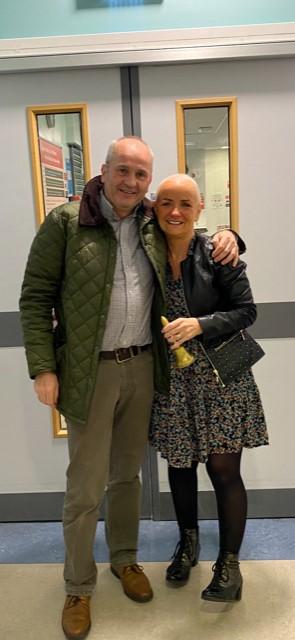
Target Ovarian Cancer knows that support for those living with ovarian cancer and their loved ones needs prioritising. The charity’s latest research, Pathfinder, found that a staggering 26% of people felt they weren’t given the chance to discuss their concerns and 48% were not signposted to support.
That’s why the Ovarian Cancer Community is a great place to go when you’re living with ovarian cancer. For me there was nowhere else I could have these conversations.
"Your friends or family didn’t have the information and your oncologist didn’t have time to answer questions that popped into your mind. Just having the OCC there, at the drop of a hat, so you could get that information and support needed made you feel better. No one wants to be part of that group but there’s an awful lot of benefits to being part of it when it was necessary.”
In his search for answers Declan had conversations with some in The Christie Hospital in Manchester, and Professor Charlie Gourley from Edinburgh University – who has received some funding from Target Ovarian Cancer. Fortunately, Pauline’s surgical team had decided to refer her case to The Christie for a second opinion and, on their advice, the decision to deny surgery was reversed. Pauline subsequently underwent a radical hysterectomy and full pelvic clearance, all of which went very well with no visible evidence of disease on completion.
In his research, Declan came across HRD testing of cancer cells - but this can only be done on a fresh tissue sample. Declan called the support line and talked through HRD testing with Valarie. These calls were pivotal in helping Pauline to receive the best possible personalised treatment.
“Without that discussion with Valarie I would never have had the courage or the understanding to ask the team in Belfast to take a tissue sample during surgery and send it off for HRD testing. Then without the HRD testing we wouldn’t have known that she had a BRCA mutation in her somatic cells and, without knowing this, she wouldn’t have been eligible to get the PARP inhibitor, Olaparib, she’s now on.
"It’s these little things, these little ‘forks in the road’ that I was praying for to open in our favour, all if which culminate in being a game changer.
"And without those chats with Valarie on a Monday some of those wouldn’t have happened and I wouldn’t have pushed for the HRD testing. I thought there just might be a little flicker of hope here, so I asked three times in the days leading up to Pauline’s surgery to ensure the sample was being taken and sent off for analysis.”
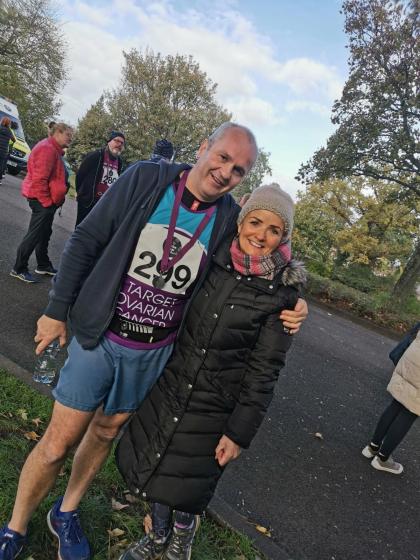
September marks two year since Pauline’s surgery. Throughout her recovery both she and Declan continued to use the supportive services available at Target Ovarian Cancer – the support line, the Ovarian Cancer Community, and attend the charity’s events such as a creative writing workshop and the annual Walk|Run event in Ormeau Park in which they raised over £25,000.
Knowing that Target Ovarian Cancer is there for both of us, on those bad days and dark days and you can talk to someone who really understands is brilliant. It’s really beneficial because we both get what we need.
Despite on her dark days believing she would never see her 60th birthday, next month Pauline will celebrate, with Declan by her side, to mark the occasion with family and friends.
Read more about Pauline and the change she is campaigning for over on our stories page.
Watch Pauline and Declan tell their story:


